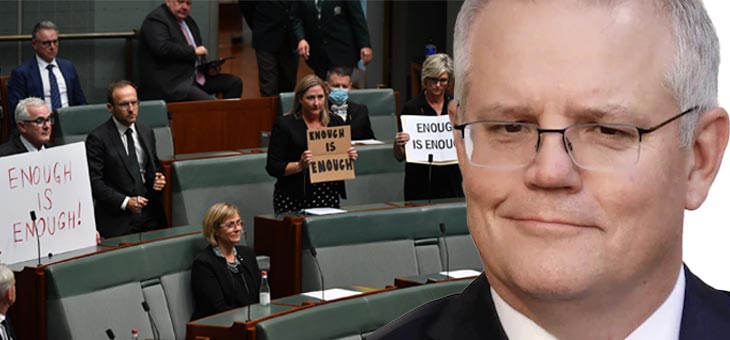Yesterday, a report detailing the experiences of hundreds of people who work in federal parliament was released, painting a pretty sobering picture of the kind of behaviour many employees have faced.
The review, done by Sex Discrimination Commissioner Kate Jenkins, was sparked in the wake of Brittany Higgins’s rape allegations earlier this year.
The headline figures included that one in three people had experienced some kind of sexual harassment and over half reported some kind of bullying, harassment or real or attempted sexual assault.
As a result, Ms Jenkins and her team made 28 recommendations to help improve the culture and support systems in place.
Here are some of the key ones:
Gender and diversity targets
The opening pages of the report say the Parliament House working environment is characterised by “power imbalances, gender inequality and exclusion and a lack of accountability”.
Changing gender inequality is something that takes time, but to help parliament start to turn it around the report recommends gender and broader diversity targets be adopted as part of a 10-year strategy.
“The Commission heard that women are under-represented in decision-making roles and that there is a lack of broader diversity across [workplaces],” the report says.
“This lack of diversity contributes to a ‘boys club’ culture and bullying, sexual harassment and sexual assault.”
As well as gender, the report wants targets to increase the representation of First Nations and LGBTIQ+ people, people with disability, and people from culturally and linguistically diverse backgrounds.
The targets would be for both staff and MPs, and progress toward them would be reviewed by an independent body.
The Prime Minister says the Liberal Party already has targets for gender.
Alcohol rules
The use of alcohol is a “dominant theme” throughout the commissioner’s review, with people who spoke talking about how pervasive the culture of drinking was in some offices, particularly political offices.
Many noted the “blurring” effects that alcohol had on personal and professional boundaries, and how many networking opportunities or events involved alcohol.
This was a point that Ms Jenkins made clear yesterday — that alcohol was not the cause of the poor behaviour that was reported, but it did exacerbate situations and “increased the vulnerability of young people, particularly women”.
Sexual assault and family violence support lines:
- 1800 Respect National Helpline: 1800 737 732
- Sexual Assault Crisis Line Victoria: 1800 806 292
- Safe Steps Crisis Line (Vic): 1800 015 188
- Men’s Referral Service: 1300 766 491
- Lifeline (24-hour Crisis Line): 131 114
In a response to these stories, the report calls for the government to develop and implement “consistent and comprehensive alcohol policies” across all Commonwealth parliamentary workplaces.
It says those polices should be developed “with a view to restricting availability in line with work health and safety obligations, and the principle of harm minimisation”.
It also suggests the policy should encourage alcohol-free networking and other events.
Codes of conduct
To bring it in line with most other workplaces, the report recommends that the entire parliament (both the House of Representatives and the Senate) should agree to create codes of conduct for MPs and staff.
It wants a committee to be created within the next six months to develop a draft code for parliamentarians and one for their staff, and for the codes to be finished and introduced within a year.
“As a minimum, the Codes should address current legal requirements that prohibit bullying, sexual harassment, sexual assault and workplace discrimination,” the report says.
“A breach of a Code of Conduct should be capable of being treated by the relevant House as a contempt.”
Respect in the chambers
While many MPs acknowledge that debate in both chambers can get pretty fiery and “robust”, the report makes it clear they also need to be safe and respectful.
It calls for the MPs that oversee the House of Representatives and the Senate to review the rules of the chambers and the “unwritten parliamentary conventions” with a view to: “Eliminating language, behaviour and practices that are sexist or otherwise exclusionary and discriminatory, [and] improving safety and respect in the parliamentary chambers.”
Hours after the report was made public a government senator was accused of growling while independent senator Jacqui Lambie was speaking, something the Prime Minister said was was “very, very [disappointing]”.
Victorian Liberal senator David Van later apologised to Senator Lambie but denied making “any animal noise”.
Support services
The report makes a few separate recommendations about expanding, creating or improving support services for MPs and staff.
Gillard urges politician code of conduct
Australia’s first female prime minister Julia Gillard has thrown her support behind the sex discrimination commissioner’s recommendation for a code of conduct for politicians.
The first is to expand the parliamentary workplace support service within three months to include all Commonwealth parliamentary workplaces, allow people to make anonymous reports through a digital platform and to also allow people to make complaints about historic bullying or sexual assaults.
Another recommendation is for a new health and wellbeing service, similar to those in other large public and private workplaces.
It says at a minimum it should provide basic physical and mental health services and be operated by “trusted and independent” practitioners.
It also needs to provide onsite and remote services and have confidentiality measures to protect those who use it.
“In addition to providing medical and psychological care, the Service would play a proactive and preventative role in promoting wellbeing,” the report says.
If you enjoy our content, don’t keep it to yourself. Share our free eNews with your friends and encourage them to sign up.


